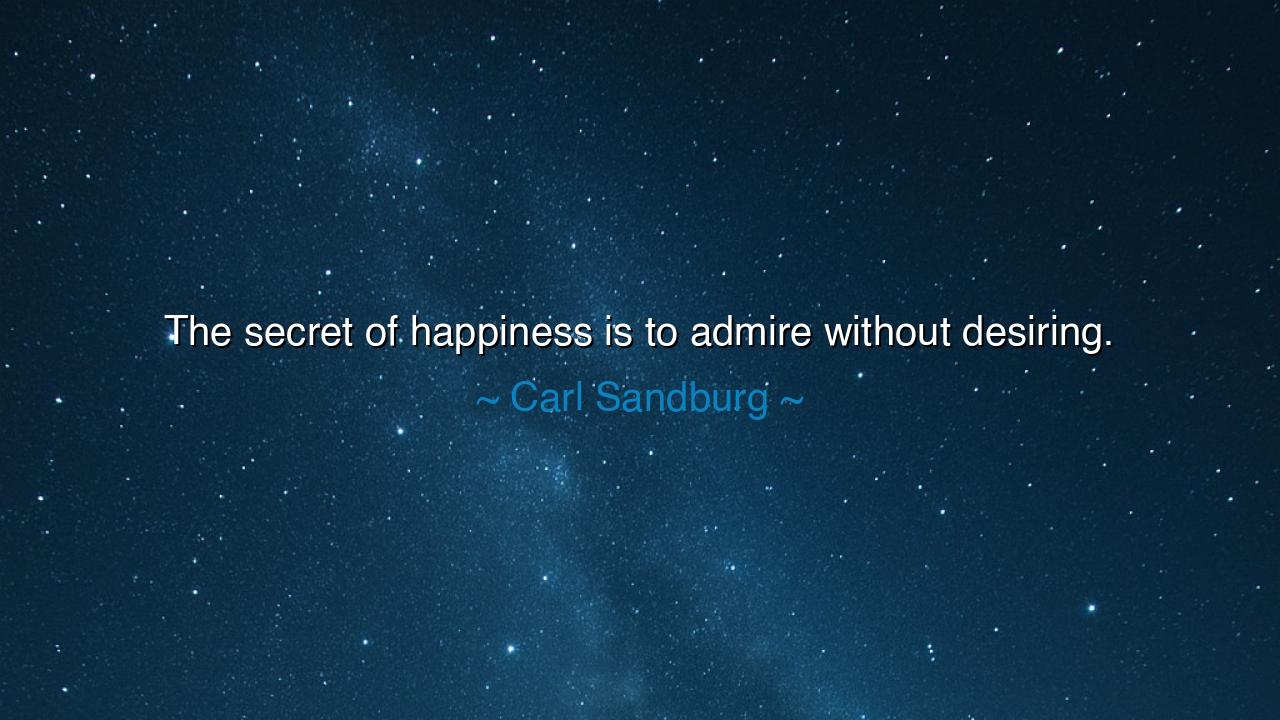
The secret of happiness is to admire without desiring.






"The secret of happiness is to admire without desiring." Thus spoke Carl Sandburg, the poet of the American spirit, whose verses breathed the wisdom of simple things—of wind and wheat, of labor and laughter, of hearts content with little. In this quiet yet profound truth, Sandburg unveils a mystery that has eluded mankind since the dawn of thought: that happiness is not born from possession, but from appreciation. To admire without desiring is to see the beauty of the world and let it be, to rejoice in what exists without demanding that it be ours. It is the freedom of the soul that finds joy in wonder rather than want.
In every age, men have confused the two—admiration and desire. When the heart sees something beautiful, it stirs with longing. We want to hold it, claim it, make it part of ourselves. But Sandburg, with the wisdom of the poet and the clarity of the sage, tells us that this very grasping is the source of sorrow. The moment we turn admiration into desire, joy becomes hunger, and beauty becomes burden. The secret, he says, is not to suppress love for the world, but to purify it—to love without possession, to praise without envy, to celebrate what is without needing to own it.
The origin of these words lies in Sandburg’s own life. Born into poverty, he labored through hardship and toil, yet he found delight in the ordinary—the song of a worker, the silence of the prairie, the laughter of children. He saw that life’s riches are not in gold or fame, but in the simple power to admire—to look upon the sunrise, the courage of others, the beauty of creation—and be content. It was this humble vision that gave his poetry its strength and tenderness. From such a soul could only come this truth: that to be happy is to live not as a taker, but as a witness to the wonder of the world.
The ancients knew this same wisdom. Buddha taught that the root of suffering is attachment—that desire binds the heart like a chain. To admire without desiring is to break that chain, to let the heart be open yet unbound. Similarly, the Stoic philosophers—men like Epictetus and Marcus Aurelius—taught that peace comes when we cease to crave what we cannot control. They too believed that happiness is found not in the possession of things, but in the mastery of the self. Sandburg, though living in another time, walked this same eternal path of freedom through detachment and gratitude.
History offers many who embodied this truth. Consider Leonardo da Vinci, the great artist of the Renaissance. Surrounded by beauty, genius, and fame, he desired not wealth or power but knowledge and understanding. He admired the world’s mysteries—the flight of birds, the play of light, the anatomy of the human form—without seeking to own them. His joy was in the act of seeing, not in the possession of what he saw. So too must we learn to look upon life not as something to consume, but as something to contemplate. For in admiration without desire lies the peace of the wise and the serenity of the strong.
This teaching does not call us to cold detachment, but to reverent freedom. To admire without desiring is not to renounce the world, but to love it rightly—to see its beauty without enslaving ourselves to it. It is to look upon a mountain and rejoice in its majesty without needing to conquer it; to behold another’s talent and feel inspired rather than envious; to see the fleeting moment and let it pass with gratitude rather than grief. Such living requires discipline, for the human heart is restless. Yet those who master this art discover that nothing outside themselves can disturb their peace, for their happiness flows from within, not from possession.
So, my children of tomorrow, take these words to heart. Learn to admire the beauty that surrounds you—the success of others, the wonders of nature, the joy of creation—without turning admiration into desire. Let your eyes be open but your hands be light. Practice gratitude for what is, and release your grasp on what is not. When you find yourself yearning to possess, pause and ask: can I love this thing simply for what it is, without claiming it as mine? In that moment of stillness, you will touch the secret that Sandburg revealed—the secret of happiness that lies beyond all wanting.
For in the end, the truly happy soul is not the one who has everything, but the one who needs nothing. To admire without desiring is to live as the free do—to move through life with open eyes, open heart, and open hands. And in that freedom, one discovers the deepest joy of all: to love the world not for what it gives, but simply for the miracle that it is.






AAdministratorAdministrator
Welcome, honored guests. Please leave a comment, we will respond soon